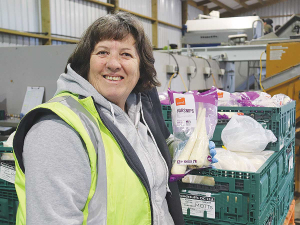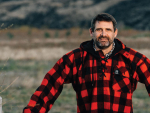The supermarkets say they want them straight and white and that's exactly how the Motts family grow their parsnips at Korioi near Ohakune.
They do this on land where, on a clear day, snow-covered Mt Ruapehu provides a stunning backdrop to their fields of parsnips and smaller crops of swedes and beetroot.
The growing conditions are challenging at times. The cold of course which is a positive for the crops they produce, but it can get wet and windy and working the land is hard yakka.
Kandy Mott, her son Jeremy and his wife Amy run the business, Mott's Premium Produce, on a total of around about 60 hectares of fertile soil. Their produce goes mainly to the Foodstuffs group which runs New World, Pak'nSave and Four Square stores.
The Motts pre-pack produce in each customer's style, and they have custom designed a special harvester to ensure the parsnips are presented the way the supermarkets prefer.
The Mott family have been farming this land for three generations. Kandy's father-in-law originally leased the land and her now deceased husband Craig and his brother Richard worked for their father. In the early days they grew carrots, parsnips and swedes, which are commonly grown around Ohakune. When brother-in-law Richard decided he no longer wished to be a commercial grower, Kandy, who has a banking background, and husband Craig were able to buy him out and eventually purchased the land they had been leasing.
Sadly, Kandy's husband Craig died in 2017, but at that point, son Jeremy and wife Amy entered the business. Their roles are defined but they also help each other when the pressure is on. Kandy runs the overall business and takes orders, Amy looks after the admin side, including staff, and Jeremy leads the team that grows the parsnips and other crops. They employ four full-time staff and a further ten during the harvest time.
Growing the right parsnip to meet the demanding standards of the market is quite a challenge, says Jeremy. He says getting the right varieties of seed is not easy and then getting it to germinate can be a problem.
"Sometimes only 60% of the seed we plant germinates, so getting the placement of seed in the ground is interesting - avoiding large gaps between individual vegetables in the paddock. Then it's a case of dealing with diseases such as nematodes and grass grubs that can damage a crop," he says.
The Mott's begin planting seeds as early as September and this continues almost until Christmas, which means they start harvesting in February and go through until October. One of the advantages of growing parsnips and crops such as carrots in the cooler central North Island region is that the matured crop can remain in the ground for months before it is finally harvested. The cool ground acts as nature's cool store.
In the early days the crop had to be picked by hand - a back breaking and time-consuming exercise.
The mechanical harvesting of carrots is quite common, but parsnips is a different story. Undaunted by this, about 11 years ago Jeremy designed and built his own parsnip mechanical harvester - a project which took him about six months and proved some of doubters in his own family wrong.
Carrot harvesters are readily available but are not suited for parsnips because they can bruise them. So the end result was a harvester which is gentler on the parsnips, resulting in less wastage of this valuable crop.
"Another factor behind this was to reduce labour costs. By handpicking we were employing about 16 people - now we have cut this by about 25%. At the same time, we have mechanised the washing and packing process which improves quality and saves labour costs," he says.
The mechanical harvester does not uproot the whole parsnip - rather a blade cuts off the vegetable in the ground to a size of roughly 230mm, which is what the supermarket requires, and a conveyor belt takes it to a bin on the tractor which pulls the harvesting machine.


















